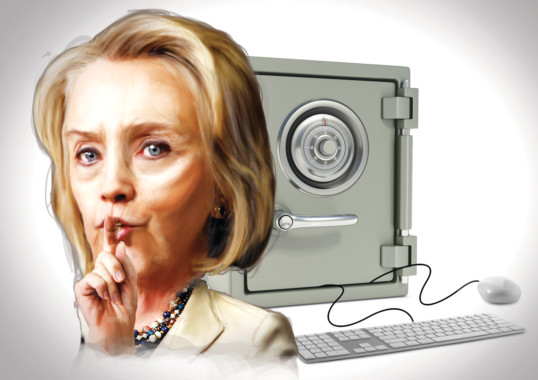
As US secretary of state, Hillary Clinton repeatedly criticised other governments for not living up to high standards of openness and transparency with their citizens, while shielding her own emails from the US archives.
During her tenure in the Obama administration, Clinton promoted a worldwide effort to improve government transparency. This effort included an action plan for the US that pledged to reform the storage of digital records and increase Americans’ access to government information.
In July 2011, Clinton gave a speech in Washington to inaugurate the Open Government Partnership, that her State Department co-chaired with Brazil.
“When a government hides its work from public view, hands out jobs and money to political cronies, administers unequal justice, looks away as corrupt bureaucrats and businessmen enrich themselves at the people’s expense, that government is failing its citizens,” she said. “And most importantly, that government is failing to earn and hold the trust of its people. And that lack of trust, in a world of instantaneous communication, means that the very fabric of society begins to fray and the foundation of governmental legitimacy begins to crumble.”
Three months later, Clinton’s State Department made several commitments for the US as part of the Open Government Partnership. One was to overhaul how the US government stores and manages its records, to create “a reformed, digital-era, government-wide records management framework that promotes accountability and performance.”
Government transparency experts said Clinton knew when that commitment was made that her own e-mails wouldn’t be included in the framework because she had established her own email domain on a server in her house in Chappaqua, New York.
Danielle Brian, the executive director of the nonpartisan Project on Government Oversight, told us that Clinton’s 2011 speech “demonstrates extraordinary hypocrisy given that while Clinton was giving this speech she had created essentially a second set of books where her communications were not being captured for the National Archives.”
Brian added that not having a State Department email, with its communications stored by the government, “undermines the whole point of the Open Government Partnership.”
Ryan Shapiro, a Freedom of Information Act expert at the Massachusetts Institute of Technology, was also stunned by the difference between Clinton’s words and actions. “Secretary Clinton’s hypocritical and self-serving stance on transparency should be deeply troubling to everyone who cares about open government and accountability,” he told us. “It’s ironic that Secretary Clinton championed an open government partnership for other countries while simultaneously working diligently to subvert transparency at home.”
The US government also made a commitment under the partnership to reform its system for processing requests under the Freedom of Information Act. It pledged to professionalise the administration that handles those requests and make government information more searchable and available to the public.
Clinton’s own emails would not be searchable or available to the public under the Freedom of Information Act because they had not been preserved on US government computer systems. Clinton handed over 55,000 emails to the State Department late last year, well after she left office. The State Department can’t be sure they represent all of her government-related communications.
In fiscal year 2012, Clinton’s last full year in office, the State Department ranked last out of the top 15 government agencies for its handling of FOIA requests, earning an “F” grade, according to the Centre for Effective Government.
Several times as secretary of state, Clinton lectured other foreign leaders about government transparency and openness. In 2010, during a trip to Armenia, she called on that government to do better.
“Democracy requires not just elections, but open dialogue, a free exchange of ideas, government transparency and accountability, and above all, an empowered citizenry, who constantly work together to make their country fairer, juster, healthier and freer,” she said.
In September 2012, at the annual meeting of the Clinton Global Initiative, she told a story about lecturing an unidentified foreign government leader for a lack of government transparency that she said was impeding his country’s development.
“‘Well, I have here a lot of the international lists of where your country stands on business climate, on corruption, on government transparency, and you are near or at the bottom. And it is time for you to recognise that in an interconnected global economy, you will benefit from doing what you should be doing internally for yourself,’” Clinton said she told the foreign leader.
“And so we have to have that kind of hard talk, which we do on a regular basis.”
— Washington Post








